
Ruth Elizabeth "Bette" Davis was an American actress with a career spanning more than 50 years and 100 acting credits. She was noted for playing unsympathetic, sardonic characters, and was famous for her performances in a range of film genres, from contemporary crime melodramas to historical films, suspense horror, and occasional comedies, although her greater successes were in romantic dramas. A recipient of two Academy Awards, she was the first thespian to accrue ten nominations.
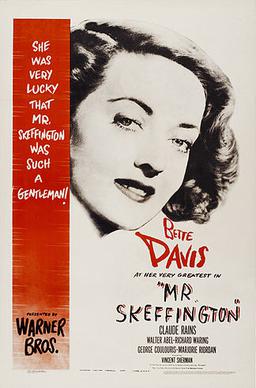
Mr. Skeffington is a 1944 American drama film directed by Vincent Sherman, based on the 1940 novel of the same name by Elizabeth von Arnim.
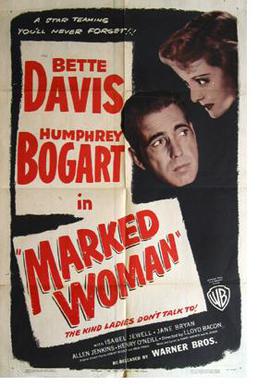
Marked Woman is a 1937 American dramatic crime film directed by Lloyd Bacon and starring Bette Davis and Humphrey Bogart, with featured performances by Lola Lane, Isabel Jewell, Rosalind Marquis, Mayo Methot, Jane Bryan, Eduardo Ciannelli and Allen Jenkins. Set in the underworld of Manhattan, Marked Woman tells the story of a woman who dares to stand up to one of the city's most powerful gangsters.

The Private Lives of Elizabeth and Essex, for a time also entitled Elizabeth the Queen, is a 1939 American historical romantic drama film directed by Michael Curtiz and starring Bette Davis, Errol Flynn, and Olivia de Havilland. Based on the play Elizabeth the Queen by Maxwell Anderson—which had a successful run on Broadway with Lynn Fontanne and Alfred Lunt in the lead roles—the film fictionalizes the historical relationship between Queen Elizabeth I and Robert Devereux, 2nd Earl of Essex. The screenplay was written by Norman Reilly Raine and Aeneas MacKenzie.

Juarez is a 1939 American historical drama film directed by William Dieterle. The screenplay by Aeneas MacKenzie, John Huston, and Wolfgang Reinhardt is based on the 1934 biography The Phantom Crown by Bertita Harding and the 1925 play Juarez and Maximilian by Franz Werfel.

A Stolen Life is a 1946 American drama film starring Bette Davis, who also produced it. The film, based on the 1935 novel A Stolen Life by Karel Josef Benes, was directed by Curtis Bernhardt. Among the supporting cast are Glenn Ford, Dane Clark, Peggy Knudsen, Charlie Ruggles, and Bruce Bennett. It is a remake of the 1939 British film Stolen Life starring Elisabeth Bergner and Michael Redgrave.

Robert Harriot Barrat was an American stage, motion picture, and television character actor.
Satan Met a Lady is a 1936 American detective film directed by William Dieterle and starring Bette Davis and Warren William.

Margaret Lindsay was an American film actress. Her time as a Warner Bros. contract player during the 1930s was particularly productive. She was noted for her supporting work in successful films of the 1930s and 1940s such as Baby Face, Jezebel (1938) and Scarlet Street (1945) and her leading roles in lower-budgeted B movie films such as the Ellery Queen series at Columbia in the early 1940s. Critics regard her portrayal of Nathaniel Hawthorne's Hepzibah Pyncheon in the 1940 film The House of the Seven Gables as Lindsay's standout career role.
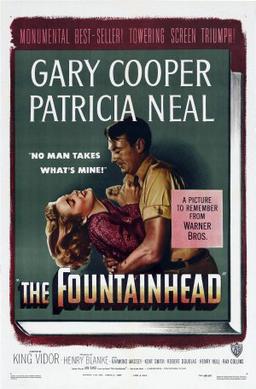
The Fountainhead is a 1949 American black-and-white drama film produced by Henry Blanke, directed by King Vidor, and starring Gary Cooper, Patricia Neal, Raymond Massey, Robert Douglas and Kent Smith. The film is based on the bestselling 1943 novel of the same name by Ayn Rand, who also wrote the adaptation. Although Rand's screenplay was used with minimal alterations, she later criticized the editing, production design and acting.
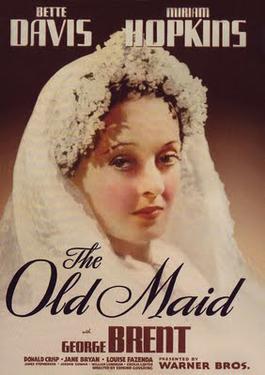
The Old Maid is a 1939 American drama film directed by Edmund Goulding. The screenplay by Casey Robinson is based on the 1935 Pulitzer Prize-winning play of the same name by Zoë Akins, which was adapted from the 1924 Edith Wharton novella The Old Maid: the Fifties.
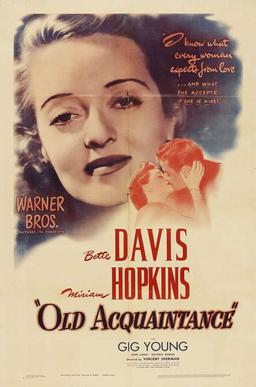
Old Acquaintance is a 1943 American drama film released by Warner Bros. It was directed by Vincent Sherman and produced by Henry Blanke with Jack L. Warner as executive producer. The screenplay by John Van Druten, Lenore Coffee and Edmund Goulding was based on Van Druten's 1940 play of the same title.
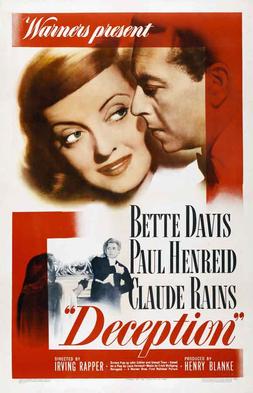
Deception is a 1946 American film noir drama released by Warner Brothers and directed by Irving Rapper. The film is based on the 1927 play Monsieur Lamberthier by Louis Verneuil. The screenplay was written by John Collier and Joseph Than. It stars Bette Davis, Paul Henreid, and Claude Rains, who had also appeared together in the highly successful Now, Voyager (1942), which was also directed by Rapper.

The Golden Arrow (1936) is an American comedy film directed by Alfred E. Green and starring Bette Davis and George Brent. The screenplay by Charles Kenyon is based on a story of the same title by Michael Arlen published in the September 14, 1935 issue of Liberty.

Special Agent is a 1935 American crime drama film directed by William Keighley and starring Bette Davis and George Brent. The screenplay by Laird Doyle and Abem Finkel is based on a story by Martin Mooney. The film was produced by Cosmopolitan Productions and released by Warner Bros.

The Little Foxes is a 1941 American drama film directed by William Wyler. The screenplay by Lillian Hellman is based on her 1939 play The Little Foxes. Hellman's ex-husband Arthur Kober, Dorothy Parker and her husband Alan Campbell contributed additional scenes and dialogue.

Charlie Chan in Honolulu is a 1939 American mystery film directed by H. Bruce Humberstone, starring Sidney Toler as the fictional Chinese-American detective Charlie Chan. The film is the first appearance of both Toler as Chan and Victor Sen Yung as "number two son" Jimmy.
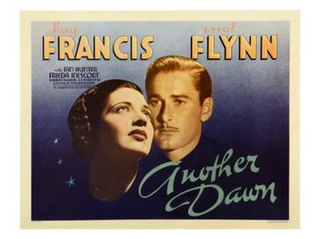
Another Dawn is a 1937 American melodrama film directed by William Dieterle and starring Errol Flynn, Kay Francis and Ian Hunter. It is based on Somerset Maugham's 1919 play Caesar's Wife. It was produced and distributed by Warner Brothers. The film received dismissive reviews.

Comet over Broadway is a 1938 American drama film starring Kay Francis, Ian Hunter and Donald Crisp. It was produced and released by Warner Brothers. John Farrow stepped in as director when Busby Berkeley became ill, but Farrow was uncredited on the film.
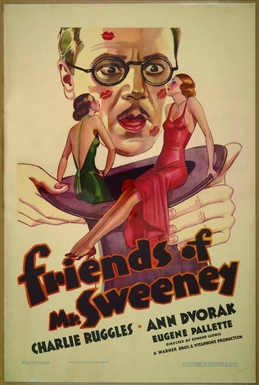
Friends of Mr. Sweeney is a 1934 American comedy film directed by Edward Ludwig and written by Warren B. Duff, Sid Sutherland, F. Hugh Herbert and Erwin S. Gelsey. It is based on the 1925 novel Friends of Mr. Sweeney by Elmer Davis. The film stars Charlie Ruggles, Ann Dvorak, Eugene Pallette, Robert Barrat, Berton Churchill and Dorothy Burgess. The film was released by Warner Bros. on July 28, 1934.



















